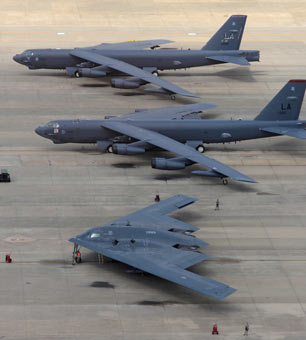The United States and North Korea are playing a dangerous game of nuclear roulette. The United States is taking actions that threaten North Korea, such as conducting war games with US ally South Korea, including practice bombing runs that send nuclear-capable B-2 bombers from Missouri to the Korean Peninsula. The North Koreans, in turn, are blustering, declaring they are in a state of war with South Korea, which, technically, is true, since a truce and not a peace agreement ended the Korean War in 1953. North Korean leaders have also cancelled the military hotline it maintains with Seoul to coordinate movement between the countries’ borders and are threatening nuclear attacks on the United States, its troops and its allies.
North Korea withdrew from the Non-Proliferation Treaty in 2003 and has since tested nuclear devices on three occasions (2006, 2009 and earlier this year). It has also tested medium- and long-range missiles and is developing capabilities to threaten the United States and its allies with nuclear weapons. The United States has responded to the North Korean tests by holding talks with other countries in Northeast Asia and putting increasingly stringent sanctions on North Korea. The United States also continues to regularly test its long-range, nuclear-capable missiles from Vandenberg Air Force Base in California. Tensions in Northeast Asia continue to rise.
Nuclear threats are an integral part of nuclear deterrence. For nuclear deterrence to work effectively, it is necessary for an opponent to believe a nuclear threat is real. When the United States joins South Korea in playing war games with nuclear-capable aircraft on the Korean Peninsula, the message of threat is clear to the North Korean leaders. Equally clear is the message North Korea sends to the United States with its nuclear tests and bluster: North Korea has a nuclear capability that could cause unacceptable harm to the United States, its troops and its allies.
From an objective perspective, each country has the capability to cause the other (or its troops or allies) horrific damage. While they are pounding on their chests and demonstrating that they are, in fact, crazy enough to use nuclear weapons, they are engaged in a drama that hopes to dissuade the other side from actually doing so. Both countries should take note of this.
The dangerous game of nuclear roulette is built into the nuclear deterrence paradigm. Each time the hammer of the gun is cocked and the gun is pointed at the other side’s head, the barrel of the opponent’s gun is also pointed at one’s own head. An accident or miscalculation during a time of tension could trigger a nuclear holocaust.
Yes, of course the United States is the stronger of the two countries and would fare better, perhaps far better, in a nuclear war, but that isn’t good enough. Yes, North Korea could be destroyed as a functioning country, but at what cost? In addition to the terrible cost in lives of North Koreans, the United States and its allies would also pay a heavy price: first, in the deaths of US troops stationed in the Northeast Asian region; second, in the deaths and devastation of US allies, South Korea and Japan, and possibly of the United States itself; and third, in the United States’ loss of stature and credibility for having engaged in nuclear warfare that destroyed the lives of potentially millions of innocent North Koreans.
Nuclear roulette has no winners. It is a game that no country should be playing. But the leaders of countries with nuclear weapons tend to believe these weapons make their own country more secure. They do not. They risk everything we hold dear, all we love and they undermine our collective sense of decency. The only way out of the nuclear roulette dilemma is to unload the gun and assure that it cannot be used again by any side.
We can do far better than we are doing. For the short term, the US should stop conducting provocative war games in the region and instead offer some diplomatic carrots rather than sticks. The US would go far to defuse a dangerous situation by again offering to support North Korea in providing food and energy for its people. For the longer term, the US should lead the way forward by using its convening power to commence negotiations for a new treaty, a global Nuclear Weapons Convention, to achieve the phased, verifiable, irreversible and transparent elimination of nuclear weapons.
Join us in defending the truth before it’s too late
The future of independent journalism is uncertain, and the consequences of losing it are too grave to ignore. To ensure Truthout remains safe, strong, and free, we need to raise $50,000 in the next 9 days. Every dollar raised goes directly toward the costs of producing news you can trust.
Please give what you can — because by supporting us with a tax-deductible donation, you’re not just preserving a source of news, you’re helping to safeguard what’s left of our democracy.
